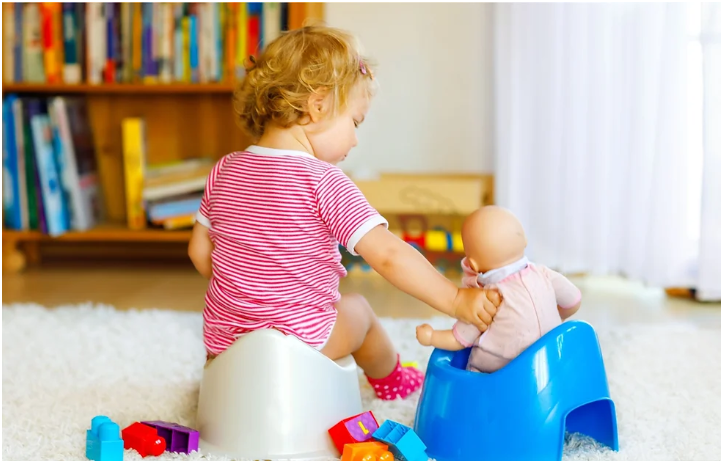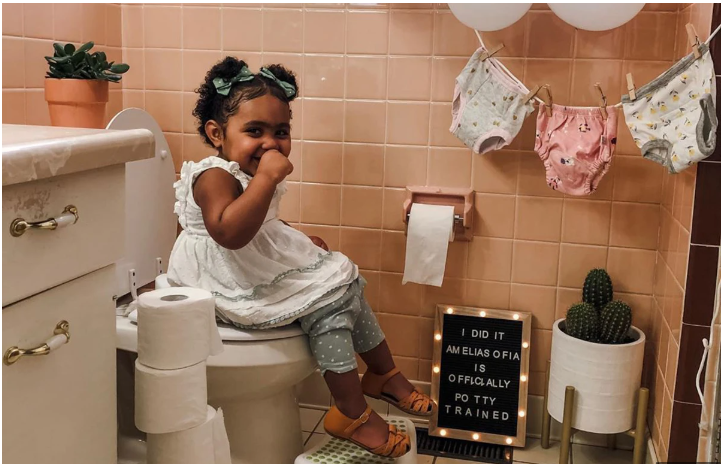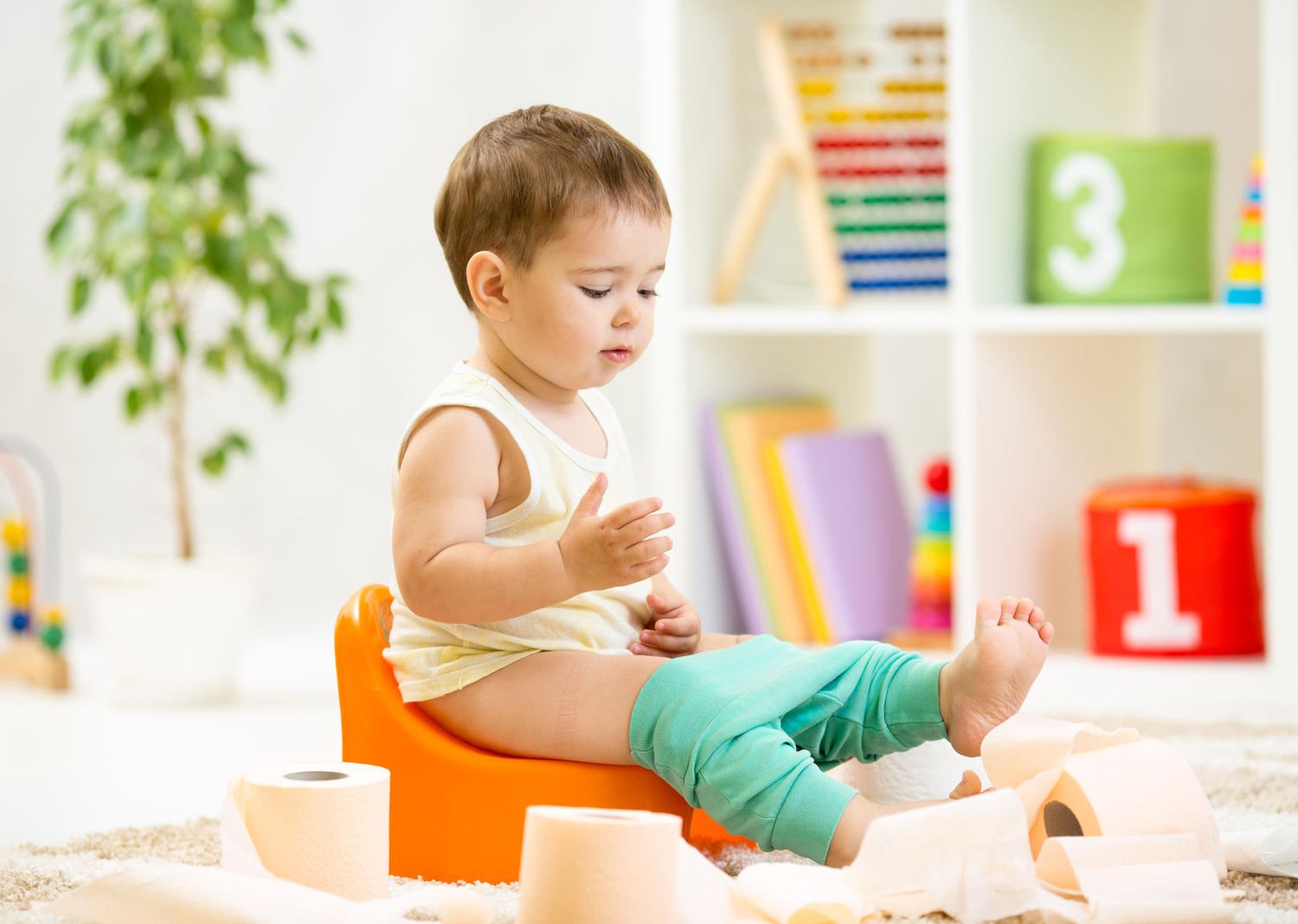Your toddler was doing great with potty training, using the potty every day, but now it seems like they’ve forgotten how! This is known as potty training regression. Don’t worry; it happens sometimes. Let’s explore why your child might be regressing and what you can do to help them get back on track.

What is potty training regression?
Potty training can have its ups and downs. If your child has reached some potty training milestones and then suddenly seems to forget what they’ve learned, they could be experiencing a potty training regression.
Since young children are learning many new things all at once, they sometimes experience setbacks. As they develop certain skills in one area, they may temporarily lose ground in another.
What’s the difference between a potty training regression and an accident?
A full potty training regression differs from having occasional accidents. Accidents are normal, and it’s expected that your child won’t always make it to the potty in time, especially during the first several months of potty training.
However, if your child is regularly missing the mark, it could indicate a regression. For instance, if your child was mostly potty trained but starts having daily accidents, they might be regressing.
Similarly, if they stay on track at home but struggle in other settings like school, they may be facing a setback in their potty training progress.
A regression is also different from bed-wetting. There’s a distinction between staying dry during the day and staying dry at night. Most kids will need more time to stay dry through the night, so a child who is dry during the day but wets the bed likely isn’t regressing—unless they were dry at night but no longer are.
Is potty training regression normal?
Skill regression during early childhood is quite common. Most children will return to their normal routine after a few days or weeks. However, if the regression lasts for a month or longer, it’s a good idea to consult your child’s pediatrician to rule out any underlying issues.
If your child is healthy but experiencing a regression, they might just need a break from potty training.
“Don’t be alarmed if your child’s potty skills regress,” says Dawn Rosenberg, M.D., a pediatrician. “It’s typically a normal, expected bump in the process, and with some patience and encouragement, they’ll get back on track.”
Why does potty training regression happen?
There can be physical, emotional, or developmental factors behind your child’s potty training regression. Like with any new skill, using the potty requires practice, and sometimes other distractions or challenges can make it hard for your child to focus on using the potty.
Here are some common reasons for potty training regression:
Your child isn’t fully potty trained yet
Moving to underwear after a few days of successful potty training might be too fast for some children, especially if they’re younger and not ready for daily consistency with this new skill.
While some kids pick up potty training quickly, others need more time and gradual practice. In other words, what looks like a regression might just be a need for more practice.
Read more: How to Deal with Sibling Rivalry: Understanding and Managing Common Conflicts
Why Do Kids Bite? Understanding the Reasons and Solutions
Your child isn’t ready for potty training
As much as you might want your child to be done with diapers, potty training can’t be rushed if they’re not ready. A regression can sometimes signal that they simply aren’t prepared yet.
If you’re unsure whether your child is ready, look for these signs:
- They can reach the potty on their own and pull their pants up and down.
- They tend to urinate a lot at once or stay dry for longer periods.
- They have regular, solid bowel movements.
- They show interest in the toilet or other people’s bathroom habits.
- They ask to have their dirty diaper changed because they dislike the feeling.
- They are in a relatively calm and cooperative stage of development.
- They have words for bodily functions and recognize the urge to use the bathroom.
If your child isn’t ready, it’s okay to pause and try again later.

Your child is stressed or anxious
Young children can often only handle one significant change or milestone at a time. If your child is going through any stress or major life change—big or small—it can make sticking to their potty training routine more challenging.
Some events that may trigger potty training regression include:
- A new sibling
- Moving to a new home or daycare
- Transitioning from a crib to a bed
- Major developmental milestones like teething
- A vacation or trip away from home
- A divorce or family separation
- A loss or death in the family
- A traumatic experience such as a car accident or medical crisis
In many cases, your child may just need time to adjust to these changes. If they seem to be struggling emotionally, though, talk to their pediatrician for advice.
In rare cases, potty training regression can be linked to physical or sexual abuse. If you notice other signs like sleep disturbances, sudden fears, or behavioral changes, it’s important to contact a professional. The Childhelp National Child Abuse Hotline can offer resources and guidance at 800-422-4452.
Your child has a medical condition
Sometimes a health issue may cause potty training regression. Constipation or urinary tract infections (UTIs) are common triggers.
Your child may avoid using the potty due to discomfort from an infection, or they may have increased bladder pressure, making it harder to control urination.
4 Tips for Managing Potty Training
1. Identify the root of the problem
To help your child overcome their regression, it’s essential to figure out what’s causing it. Look at changes in their environment, routine, or mood. Have they experienced anything new or stressful?
You can also track when and where accidents happen to see if a pattern emerges. This might give you clues as to why the regression is happening.
If you can’t pinpoint the issue, encourage your child to talk about their feelings. While very young kids may struggle to communicate, simply knowing you’re there to listen can make a difference.
If your child is experiencing physical symptoms like constipation or discomfort when using the bathroom, it’s time to see their doctor.
2. Address any unmet needs
Once you’ve identified the cause, you can begin addressing it. For example, if your child is struggling at daycare, you might want to speak with their caregivers to find a solution.
Medical issues can be treated by a healthcare provider, but developmental or emotional concerns may require more time. You might consider reading books that help children navigate anxiety or stress related to family changes or other situations.
Your pediatrician can also recommend resources or strategies to help your child.
3. Go back to the basics
Depending on what’s behind your child’s regression, you may need to restart potty training from the beginning.
Reintroduce the potty training process you used before, including any charts, rewards, or reminders. Your child may need a refresher to build back their confidence and consistency.
4. Be patient
Watching your child struggle with a skill they seemed to master can be frustrating, but potty training regressions are very common and usually not a sign of a larger problem.
Remain patient and supportive. Avoid expressing frustration or anger toward your child, and instead focus on understanding the cause of their regression and helping them through it.
Key Takeaways
- Potty training regression happens when a child who was using the potty successfully starts having frequent accidents.
- This type of regression is normal for young children and typically resolves on its own.
- Various factors such as stress, illness, or major life changes can contribute to a regression.
- If the regression persists for a long period, or if you’re concerned, reach out to your child’s healthcare provider for guidance.











3 thoughts on “What to Do About Your Kid’s Potty Training Regression”